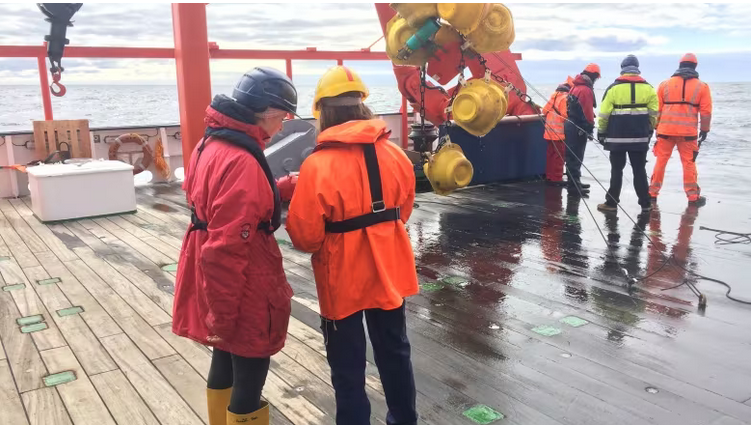Where sand dunes disappear on Sable Island, so does the underground freshwater supply, according to new research underscoring the importance of dunes to the island's ecosystem. The dunes serve as a natural barrier, protecting against the relentless waves and temporary salinization of groundwater caused by ocean flooding. Dunes also help refresh the water table by funnelling water from rain and snow into aquifers that, in some places, are 40 metres deep.
Rising levels of chloride, aluminum in Halifax lakes a concern, study says
Levels of chloride, arsenic and aluminum in some Halifax lakes are a concern, according to a newly published Dalhousie University study. The peer-reviewed study examined four decades of water quality data from 50 lakes. It says that concentrations of aluminum in 29 per cent of the lakes, chloride in 20 per cent of the lakes and arsenic in one lake exceeded Canadian aquatic life protection guidelines.
Ottawa grants $154M to Dalhousie-led study on North Atlantic and climate change
Dalhousie University in Halifax will lead what it calls "the most intensive investigation ever into the ocean's role in climate change" thanks to $154-million in federal funding announced Friday. The research program is getting a piece of $1.4 billion awarded to Canadian universities by the federal government through the Canada First Research Excellence Fund.
Smaller Canadian cities rank high on environmental scorecard that has a few surprises
A new environmental scorecard says Canada's biggest cities have lower scores than most small and medium-sized municipalities, but a closer look at the data reveals some surprises. The study, published Tuesday in the journal Environment International, rates 30 of the country's largest cities and towns on nine indicators related to health, including air quality, heat and cold waves, ultraviolet radiation, and access to green spaces. The results are compiled in the new Canadian Environmental Quality Index, produced by Dalhousie University in Halifax.
Rooted in community: Dalhousie innovators celebrated for their impact in Nova Scotia and beyond at Discovery Awards
Dr. Amina Stoddart, a professor in Dalhousie’s Department of Civil and Resource Engineering, is applying her expertise in wastewater treatment to help advance the state of the art in water utilities. In 2020, Dr. Stoddart was awarded a highly competitive, internationally peer-reviewed 3-year, $1 million Collaborative Research and Development (CRD) Grant with Halifax Water from the Natural Sciences and Engineering Research Council of Canada (NSERC) focused on wastewater surveillance and wastewater treatment optimization. This award is one of the largest CRD grants ever awarded to a faculty member at Dalhousie University. The goal of her research is to improve the effluent quality of the wastewater systems operated by Halifax Water. Through a series of studies Dr. Stoddart and her research team will identify chemical treatment optimizations, illuminate fouling mechanisms, test new technologies for disinfection, and assess discharge of contaminants of emerging concern, including microplastics.
N.B. wastewater data suggests some COVID-19 cases went undetected in 2021
Public Health officials have raised questions around whether some COVID-19 cases in New Brunswick went undetected in early 2021, after an apparent mismatch between the amount of COVID-19 appearing in wastewater and the province's own COVID-19 testing. The wastewater data shows four apparent spikes of COVID-19 in 2021: on Feb. 8, March 18, April 29 and June 28, all times when there were "minimal cases or positive tests" reported and PCR testing was widely offered. The wastewater testing is conducted by the City of Moncton, which has a partnership with Dalhousie University, and is provided to New Brunswick Public Health. CBC News obtained a copy of the test results, and discussion within the Department of Health about the results, through access to information.
MORE THAN $25 MILLION IN SUPPORT UNLOCKED FOR STRATEGIC RESEARCH PROJECTS AT DAL
John R. Evans Leaders Fund/Research Nova Scotia funding will support projects focused on: Customizing polymers for use in pharmaceuticals, water treatment, oil recovery, and more.
Research Nova Scotia will also contribute over $700,000 in funding needed to match federal funds to support Dalhousie researchers working on projects led by other universities, including research focused on improving the quality of drinking water produced by forests, led by the University of Waterloo, and research to better understand the human aging process, led by McMaster University.
Omicron was in Nova Scotia wastewater before it was identified in South Africa
New data from researchers at Dalhousie University show that Omicron was in Nova Scotia wastewater weeks before it was identified by the province — and even before the new COVID-19 variant was reported by South Africa. Graham Gagnon, professor, and director of the Centre for Water Resource Studies confirmed in an email that: “Our team detected Omicron , retrospectively, in Nova Scotia wastewater in mid-November and will be able to provide further information in the future.”
New data shows Omicron was in Nova Scotia wastewater in November
A research team at Dalhousie University started detecting Omicron in Nova Scotia wastewater weeks before the COVID-19 variant was officially confirmed in the province. "It was surprising to us to see a viral signal in early November. Only in retrospect were we able to see that it was a variant and not the original," said Prof. Graham Gagnon, director of the Dalhousie University Centre for Water Resource Studies.
$1 device developed in Halifax that helps detect COVID-19 in sewers drawing global interest
A $1 device developed at Dalhousie University in Halifax that can help detect COVID-19 in wastewater has been shipped across Canada and around the world to help researchers and public health in the battle against the deadly respiratory illness. The device is a small, spherical cage that contains an absorbent pad to collect samples from sewer systems. The specimens are then analyzed using lab equipment to determine whether COVID-19 is present in the wastewater.
Dalhousie researchers able to detect COVID-19 in waste water sampling
Twenty-three-year-old PhD student Emalie Hayes is currently studying Civil Engineering at Dalhousie University. Last year, she created a COVID-19 testing device that can detect the virus through sewers. The COVID-19 sewer cage, called the Cosca, is made by a 3D printer out of plastic, which takes several hours to print, and is then assembled by hand, which takes less than a minute.
Shoal Lake First Nation lifts 24-year boil water advisory, but there’s more to do: experts
Experts say Canada still has a long way to go. “It could be measured in years because not only is it the current boil water advisories as they exist, but we also need to make sure that the facilities that are operating remain safe and remain regulated and (are) operated properly,” said Dr. Graham Gagnon, director for the Centre for Water Resources Studies at Dalhousie University.
Expert says blue-green algae may not be cause of Grand Lake contamination
Tri Nguyen-Quang, an engineering professor whose research includes water quality and management, collected samples of the lake water around the shoreline last week. "I think there is some very harmful substance, chemical substance in the water. But that I don't know yet," Nguyen-Quang said Monday. "So far, just the impression that … something is not normal there."
WATER WORLD: MEET ONE OF THE DAL EXPERTS MAKING INTERNATIONAL WAVES IN CLEAN‑WATER RESEARCH AND OUTREACH
Dr. Jamieson’s research involves examining how ecologically engineered systems can be used for water management in cold climates. He is aiming is to integrate naturally-occurring biochemical processes in the design of sustainable environmental management systems and assess their potential environmental risks. For example, engineered wetlands for wastewater treatment do not require energy and chemical inputs. These are relatively cheap and easy to maintain, making them an attractive option for small, isolated communities with limited resources.
How microbes could help clean up Nova Scotia's abandoned mines
Researchers from three Maritime universities are hoping microbes collected from the bottom of a lake near an abandoned gold mine in Dartmouth, N.S., will provide a model for how to clean up contaminated sites across the province in a quicker and less-intrusive way. Last May, a research team took a boat to the middle of Lake Charles, not far from the former Montague gold mine, where extensive mining took place from 1860 to about 1940.
Nova Scotia researchers look into wastewater as COVID-19 tracker
Nova Scotia researchers are looking into flushing out new ways to track COVID-19. Studies in countries such as the Netherlands and Switzerland have targeted the genetic remnants of the deadly virus in municipal wastewater systems. They found that tracking the ribonucleic acid (RNA) fingerprint of COVID-19 in specific wastewater locations mirrored the later emergence of cases through clinical testing in the community.
Moncton could spend $27M on 'worst case' algae fix
Moncton's $77.6-million capital budget sets aside millions to deal with blue-green algae in the municipal water supply. Jack MacDonald, Moncton's general manager of engineering and environmental services, said the city will work with Dalhousie University to study whether a water purification system could be added at the treatment plant to handle the algae.


















